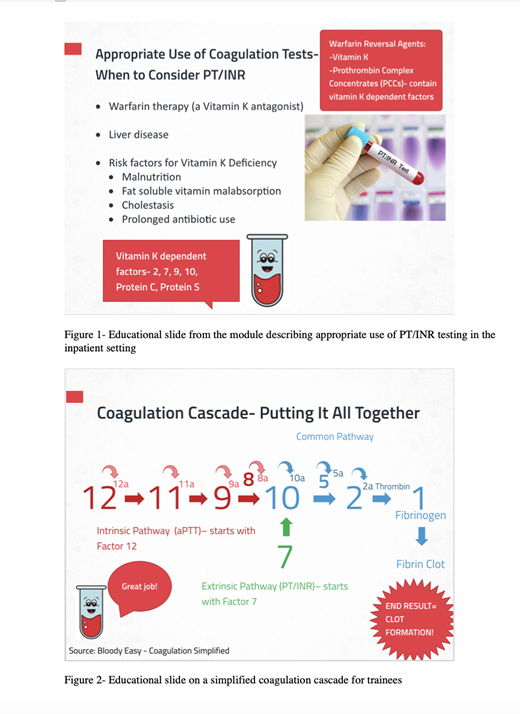
Background: Coagulation has notoriously been a topic that medical trainees find challenging to learn. A lack of understanding around coagulation has led to widespread inappropriate ordering of commonly used coagulation tests, including the prothrombin time (PT) and the activated partial thromboplastin time (aPTT). Despite these tests being validated for specific clinical indications, they are frequently ordered as screening tests in unselected patients, and often ordered together, suggesting a gap in physician understanding of coagulation and appropriate testing. To explore this further, we conducted a root-cause-analysis survey of 10 medical trainees. 70% of the surveyed trainees did not feel comfortable with their knowledge regarding coagulation and the appropriate use of coagulation tests. Trainees attributed their suboptimal knowledge to the manner in which coagulation is taught in training programs. Furthermore, they identified a scarcity of practical resources on coagulation and expressed interest in a web-accessible resource.
Methods: We created an educational module on coagulation testing for trainees, available online at www.coagtesting.com. This module was created with the intent of simplifying the teaching of coagulation, with a focus on emphasizing clinically-relevant concepts. The module was evaluated at the University of Toronto with 50 participating medical trainees (11 medical students, 39 internal medicine residents [14 PGY1, 15 PGY2, 10 PGY3 residents]). Participation in our study included completing a validated knowledge pre-quiz on coagulation, completion of the educational module, and then the post-quiz following the module. To assess longer term knowledge retention, participants were asked to repeat the knowledge quiz three months following their initial participation. Our educational intervention was evaluated according to the Kirkpatrick Model, a framework for learning evaluation, with educational outcomes organized into four ranked levels (level 1, reaction; level 2, learning; level 3, behaviour; level 4, results). The primary objective of this study was to determine if the module improves trainee knowledge of coagulation, as indicated by their quiz results (level 2, learning). The secondary objective was to evaluate if the module has an influence on trainee ordering practices as assessed by a follow-up survey (level 3, behaviour).
Results: The median pre-module quiz score was 67% (range 24% - 86%) with an increase of 24% to a median post-module quiz score of 91% (range 64% - 100%). Notably, in the pre-module quiz, 94% of trainees overestimated the sensitivity and specificity of the PT and aPTT in detecting a bleeding disorder, and 44% of trainees underestimated the cost of a PT test. 80% of trainees described increased confidence regarding their knowledge of coagulation and the use of coagulation tests following completion of the module. In addition, we have demonstrated sustained knowledge acquisition with a 3-month post-quiz median score of 89% (n=15, range 67%-100%). 100% of trainees who completed the 3-month follow-up survey (n=15) felt that the educational module had a positive influence on their practice and 87% of trainees were more likely to consider the sensitivity, specificity, and cost of a lab test prior to ordering it. In the seven months since the module was launched, it has been completed by over 2,000 unique visitors worldwide, with use in Canada, the United States, the United Kingdom, Australia, France, and Saudi Arabia according to data from our website host. Furthermore, several visitors to the website have re-visited the module multiple times.
Conclusion: We have successfully demonstrated a significant increase in trainee knowledge and confidence regarding coagulation and appropriate use of coagulation tests with our educational intervention. Using the expertise of medical educators and incorporating feedback from trainees, we have employed a novel approach to the teaching of coagulation to maximize its approachability and clinical relevance. Our module also incorporates education on the cost of coagulation testing and appropriate use of these tests thus in line with the tenets of Choosing Wisely. The degree to which trainees have been utilizing and re-referring to our educational module worldwide emphasizes the need for this resource and its importance in bridging a large gap in medical training.
Sholzberg:Novartis: Honoraria; Amgen: Honoraria, Research Funding.
Author notes
Asterisk with author names denotes non-ASH members.

This icon denotes a clinically relevant abstract


This feature is available to Subscribers Only
Sign In or Create an Account Close Modal